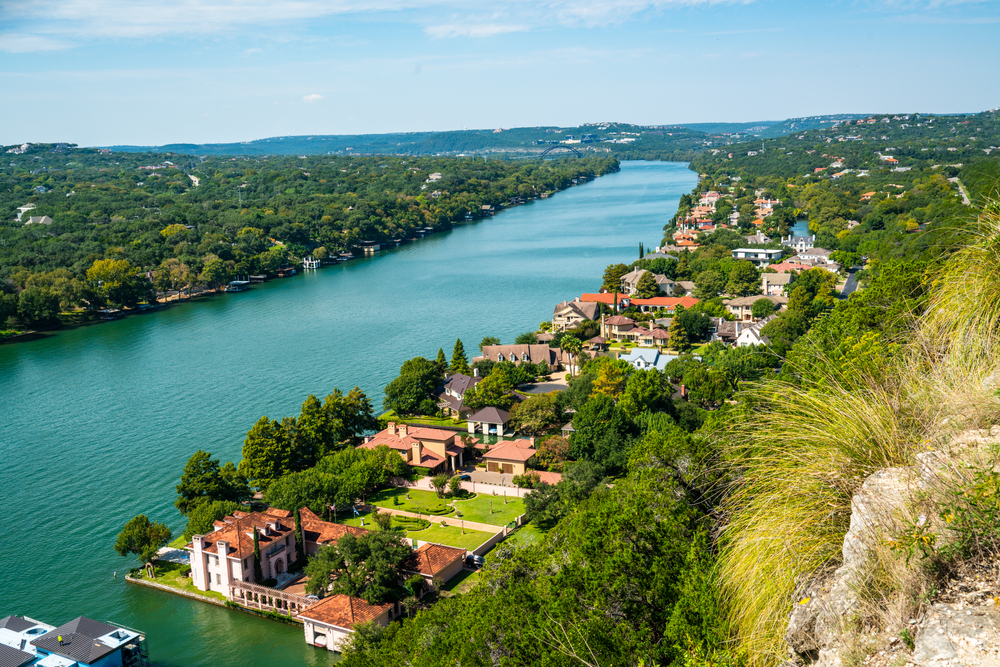
Common Plumbing Problems in Austin Homes (And How to Prevent Them)
October 9, 2025
How Austin’s Climate Affects Your Plumbing: Floods, Droughts & Freezes
October 9, 2025Hard Water in Austin Homes: Causes, Effects & Solutions
Austin’s limestone aquifers and clay soils supply water rich in calcium and magnesium – a blessing for breweries but a curse for your plumbing. Hard water leaves a scaly residue on faucets and fixtures, shortens the life of water heaters, and leaves your skin feeling dry and hair dull. In this guide, Flint Plumbing explains what hard water is, how it affects your home, and what you can do about it.
What Is Hard Water?
Hard water contains high levels of dissolved minerals, particularly calcium and magnesium. When groundwater passes through limestone and chalk in the Edwards and Trinity aquifers that supply Austin, it dissolves these minerals. The hardness of water is measured in grains per gallon (gpg) or milligrams per liter (mg/L). Anything above 7 gpg (120 mg/L) is considered hard. Austin’s tap water typically ranges from 120–170 mg/L, which is moderately hard.
Why Austin’s Water Is Hard
Central Texas sits on a bed of limestone and dolomite that readily dissolve into groundwater. Most municipal wells in Austin, Buda, Kyle, and Round Rock draw from the Edwards Aquifer, a karst formation known for its mineral-rich water. During droughts, utility companies may also blend water from surface reservoirs such as Lake Travis, which can increase hardness. That’s why homeowners across Travis, Hays, and Williamson counties often notice white scale on showerheads and kettles.
Signs You Have Hard Water
Wondering if hard water is causing issues in your home? Look for:
- Scale buildup: White or greenish deposits on faucets, shower doors, and coffeemakers.
- Soap scum: Difficulty getting soap to lather and a filmy residue left on skin, hair, and dishes.
- Clogged or slow drains: Mineral deposits accumulate inside pipes, restricting flow and lowering water pressure.
- Shortened appliance lifespan: Water heaters and dishwashers break down more quickly due to scale on heating elements.
- Laundry issues: Clothes may feel scratchy or fade faster because minerals prevent detergents from working effectively.
If you’re experiencing these issues, hard water is likely the culprit.
How Hard Water Damages Your Home & Wallet
Beyond being a nuisance, hard water can cost you money:
- Reduced water heater efficiency: Just 1/8 inch of scale buildup can cut efficiency by up to 25%, causing your gas or electric water heater to use more energy.
- Frequent repairs: Scale buildup in pipes, valves, and fixtures causes leaks, reduced flow, and premature replacement.
- Increased energy bills: Appliances must work harder to heat water or run cycles, leading to higher utility costs.
- Skin and hair irritation: Residual minerals strip natural oils, leading to dryness and irritation.
Investing in a solution can save you money over time and protect your home’s plumbing infrastructure.
Solutions to Hard Water in Austin
You don’t have to live with the effects of hard water. Here are effective solutions:
- Whole-House Water Softener: A traditional ion-exchange softener removes calcium and magnesium ions from all incoming water. It requires a salt brine to flush the resin bed and periodic maintenance, but it’s the most comprehensive solution.
- Salt-Free Conditioner: Uses template-assisted crystallization (TAC) or catalytic media to prevent minerals from forming scale. Ideal for homeowners seeking low maintenance and those on sodium-restricted diets.
- Point-of-Use Filters: Reverse osmosis (RO) systems or under-sink filters provide softened water for drinking and cooking. They’re less expensive but treat only one faucet.
- Regular Descaling & Maintenance: Flush your water heater every 6–12 months, descale fixtures with vinegar, and replace showerheads to minimize buildup. See our Austin Water Heater Maintenance Guide for step-by-step instructions.
Every home is different; talk to a licensed plumber to choose the best system for your water usage, family size, and budget.
Get Professional Help & Save Money
Installing a water softener or conditioner is more complex than connecting a filter. A licensed Master Plumber will ensure your system is sized correctly, configured to Austin’s hardness levels, and compliant with local codes. At Flint Plumbing, our team has been helping families across Austin and the Hill Country solve hard water problems for over 40 years. Our license M-42279 and same‑day service guarantee mean you can trust us to deliver clean, softened water without surprises.
Call us at (512) 971‑2445 or book an appointment online to schedule a water quality test and get expert recommendations. Softer water isn’t just about comfort – it’s about protecting your plumbing, saving energy, and extending the life of your appliances.
Frequently Asked Questions
How hard is the water in Austin?
Austin’s water typically tests at 6–10 grains per gallon (120–170 mg/L), which is considered moderately hard. Levels can vary depending on the water source and season, but most homes experience noticeable mineral buildup.
Do I really need a water softener in Austin?
If you’re seeing scale, dealing with clogged faucets, or noticing dry skin and hair, a water softener can make a big difference. It also helps protect expensive appliances like water heaters and reduces energy costs.
Are salt-free conditioners effective?
Salt-free conditioners don’t remove minerals; they change how they behave so they don’t stick to surfaces. They’re easier to maintain and suitable for people on low-sodium diets, but they may not be as effective as traditional softeners for severe hardness.
How often should I service my water softener?
Check salt levels monthly and refill when low. Have a professional inspect and service the system annually to ensure proper operation and regenerate the resin bed if needed.

